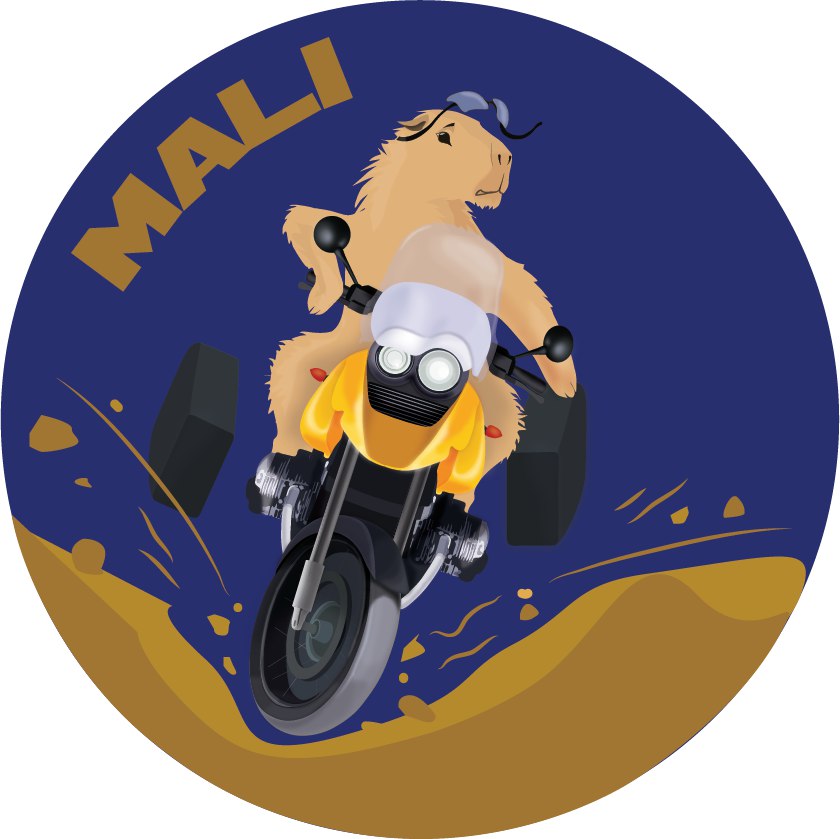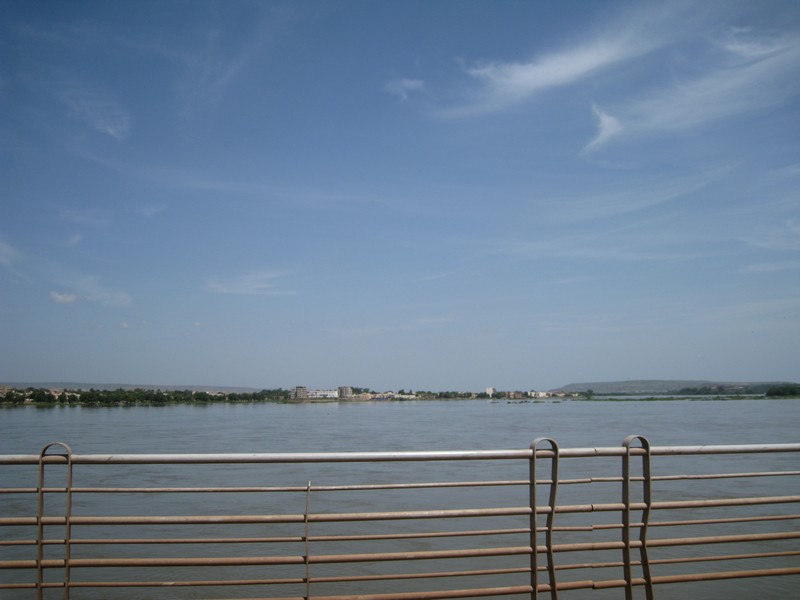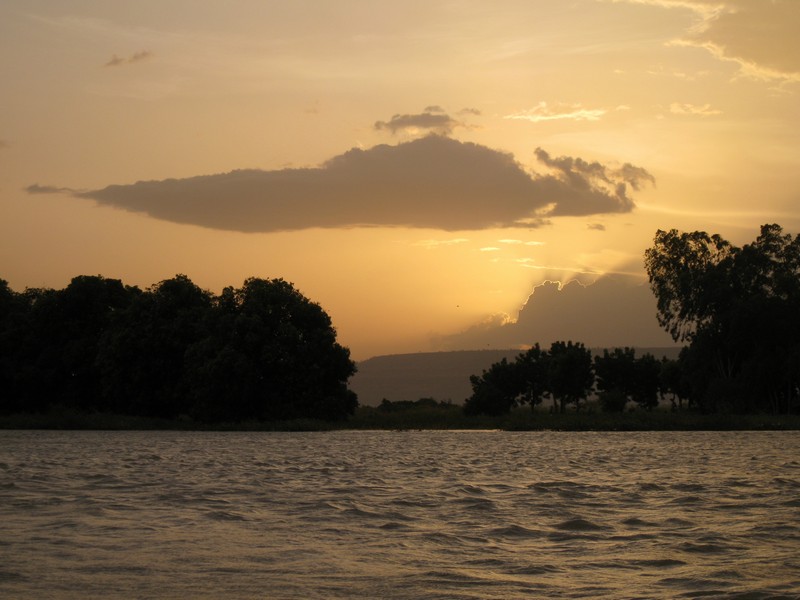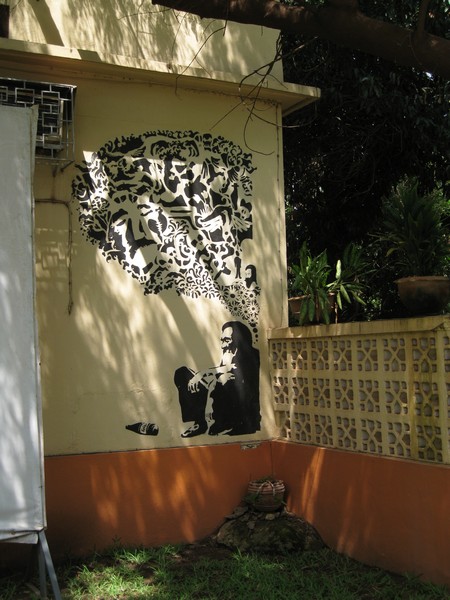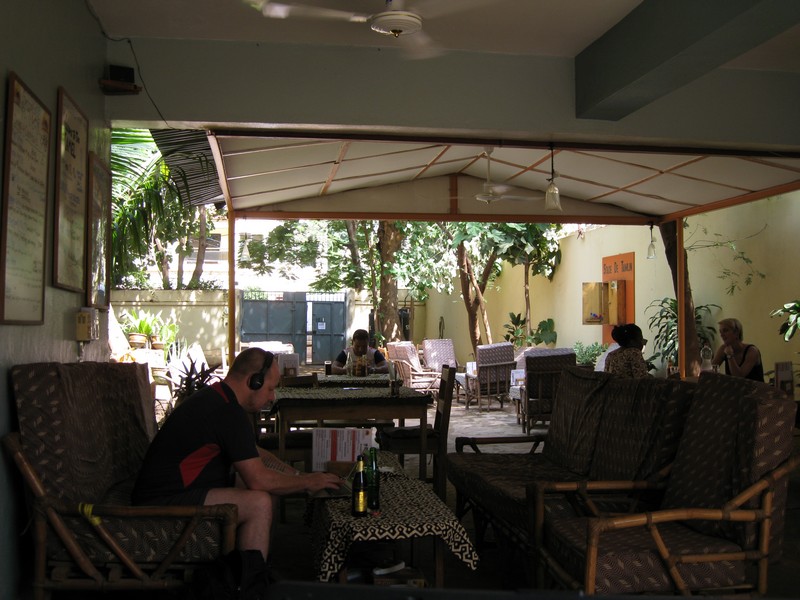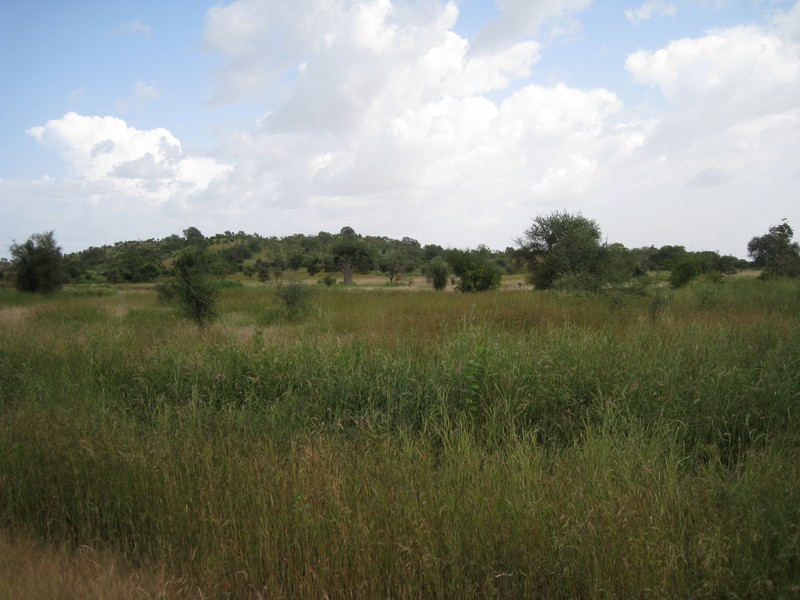The border between Senegal and Mali was not quite clear. Long queues of trucks on a narrow strip of the road and spontaneous market on the edges. No pointers to customs but there are pointers to the nightclub. Not a bad start.
We are gradually squeezed between trucks until stopped at a barrier. Yeah, it has to be here somewhere. Guards sitting at the barrier showed us to park near them and go to the building nearby to submit passports. We went to the small window in the wall, unleashing the most serene look and trying to show by our appearance that we have a tons of time in stock. After we handed over our passports we found chairs nearby and collapsed on them. Local old man was sitting nearby and he was preparing tea. He shared it with us. The tart, sweet, that’s what you need in the morning. Mark did not stop to enjoy the fact that the local children and other beggars does not stick to him. I convinced him that we should not rush into assessments. Five minutes later customs officer came to us with our passports. He came out and brought it to us by himself! Even I began to think about the differences between the two neighboring countries. We returned to our steel horses, and were called by one of the customs officers. He looked menacing. “Here we go” we said to each other, waiting for difficulties. But he grinned and shook hands to each of us and said that he was honored to see travelers in his country. Well, Mali pleases us from the first minute, it’s damn nice.
Leaving the border village Mark and I stopped and said goodbye. My journey to Bamako, capital of Mali, will take one to two days. For him it will take six days. In any case, I planned to hang in Mali for a couple of weeks, so we had no doubt that we will meet once again. Unscrewing the throttle I rolled over quite a good road and almost immediately stumbled upon a tollroad post. Back in Dakar, I was able to talk on HorizonsUnlimited forum with one mototraveler from Spain, named Jonathan. He started later than me, but he was more systematical and was already in Bamako. He was going to Cape Town too, so we also agreed to meet in the capital and maybe to continue our way together. On the road to Kidira I got a message from him – if you see tollroad points on the road go around them on the sidelines as all local mopeds do. Otherwise, you’ll get a fine(!) if you try to pay and drive through the barrier as cars. I then thought that I had somehow misunderstood him. However, at the entrance to the toll collection point I saw the sign – two-wheeled vehicles have to detour to the right. On the sidelines. Eccentric system. Okay, at least it’s free.
During the first turn, I saw truck in the ditch, burned to ashes. I slightly stiffened.
Later down the road I saw a lot of things like this. Vehicles burned or simply destroyed in the accident. Judging from the tracks and lumps of tires around – it seems that major cause of such accidents is the wheels blown up. In the Africa nobody cares about that. They ride until tires explode. This is indirectly confirmed also by constantly encountered trucks, whose drivers jumped on the wheel wrench changing the tire exploded on a spare one.
Everything was beautiful. And the ubiquitous donkeys.
Most of the road was nice and easy. I carefully maneuvered to avoid suddenly appearing pits on the road. Avoided tollroad posts by the sideways. Stopped in the villages to buy cold water in a plastic bag, carefully avoiding dehydration and overheating, bitter experience after Dakar. It begins to darken when it was about one hundred kilometers to Bamako. And here all hell broke loose.
Asphalt road has become increasingly interspersed by tarmac. It got dark completely. Once there was the asphalt, now it was rolled up to the ground in some places but the holes still remain. The road was nothing but a sieve of the pits. Goddamn pits were everywhere. If you attempt to go round the pit, then you may be able to avoid be one or two but the third will get you for sure. Most of the time it was safer to go by the sideways. Trucks were everywhere. They went carefully avoiding the holes using the whole width of the road. They did not care about the others. If two such trucks met they were blinking lights and buzzed each other to the last meters and only then attempted to drift apart. Overtaking was a lottery – you never know where the truck going to turn next seconds. Complete the picture with the dust, the ubiquitous dust. The dust from the wheels, dust in the wind and just goddamn dust.
I thought that it is a good idea to find a place for the night and stopped at the last town before the Bamako. And I realized that I made a mistake. In the city of Kayes, in the beginning, I took some cash from the ATM, assuming that I can do it in the future along the way. Of course it was my blunder. There was bank in the city, but it was closed for renovation … Next one was in Kati which is a suburb of Bamako. Also on the horizon loomed another problem – with the remaining gasoline I was not sure if I can do it even to Kati… What else can I do? I’m back on the road.
It was difficult to call it otherwise than overbearing. I slowed down at first to 80 kilometers per hour. Then to 60. Then to 40. It did not help. Because of the dust visibility was almost zero. Most of the holes were not deep, but appeared suddenly, and sometimes after a series of maneuvering between the small holes at the end, as the final boss, was waiting a big, deep one, waiting. I could not refuse such pleasant offer, flying there with both wheels. Me and the bike was all right except for strikes in bashplate, and I went on. But luggage was not so good to handle it. In one of the pits left sidecase went off ejected. I retreated to the sideline swearing and returned it back into place. Frame lock became loose with every such time. Again, an insidious series of holes with a deep end, again fallen off sidecase. With the help of some garbage I somehow strengthen mount of the coffer. After a while I flew into a hole again, trying to overtake unpredictable passing truck as soon as possible. Again a strike in bashplate, and this time both sidecases went away to fly off. I stopped at the curb and lay down on the handlebar for a couple of seconds. Then, cursing out loud I went to pick up trunks illuminated by headlights of stopped truck. When I gathered all the luggage truck drove on calmly. I examined coffers. One of the cap locks on leftside case was destroyed. Shit, with this advancing I will arrive to Bamako with all the luggage unclosable. I slowed down even more and trudged on, sometimes stop completely to first look at the path of travel between obstacles.
When it was about 50 kilometers to Bamako,I was stopped at a police post in one of the villages. I was somehow glad because I needed some rest. While one of the policemen copied my data, the other one in some English asked me whether all is well. I complained about the quality of the roads and he laughed. But this is not the most important thing that worries me, I said. I am concerned about gasoline – and I poked a finger at warning light on the dashboard which started to burn long way ago. He walked away and came back a minute later and asked if 5000CFA is enough. I opened my mouth surprised. Many police stations in other countries tried to rip me off, but offer of help! Oh, Mali … I was extremely thankful. 5000 is more than 5 liters of petrol! That’s certainly enough to Bamako. More than that – the officer asked me if I knew where the nearest gas station, and I answered that I do not know, and he jumped in the car and asked to follow him. Station is not on the road, he said, maybe you will not find it. We drove to the next village, turned several times and were at the gas station. I refueled. Police guy escorted me back to the track and wished a happy journey. I stood on the sideline and smoked. I passed a lot of villages before and saw that often there you can not even buy something to eat with meat, they simply don’t have it. Life here is not easy sometimes. Nevertheless, these people were kind. Much better and honest than in Senegal. The contrast between the two countries is simply amazing. And what the police guy did – it is the real thing. I mentally wished happiness to him and his family. And I moved on to conquer another holes and pits.
The last leg of the journey to Bamako I drove for almost three hours. I have resigned myself to the thought that I did not meet anyone today to communicate. All I wanted to is to arrive finally and maybe drink something, and after lay down to rest. In this scenario, I have not had to choose a place where to stay. Back in Dakar, when I received a visa for Mali (simple and easy, 24000CFA, and two profile pictures, the next day ready) and filled out a questionnaire – I was puzzled by the question what to write in the “alleged place of residence.” There was a couple of travelers engaged in filling form and they told me: “Write Sleeping Camel anyway all travelers go there.” I wrote. And now it is recalled in my mind and I dug a little bit in the Navigator. Yes, there is such a point in the POI. I set up the route and drove the last 3 kilometers.
In the last few meters I skirted the territory of the German Embassy, which somehow looked like a fortress, and stopped near tightly closed gray colored gate. At the entrance a couple of people drank tea. Little bit embarrassed by the absence of any signs I already thought that the point in the navigator may be obsolete but one of them said – Sleeping Camel? I nodded, and they knocked at the gate. Gate opened and I entered the territory. Lovely small hotel and bar. Nice. Place for camping was on a small lawn at the hotel. I quickly scattered tent and sat down at the bar which was still open. Bloody fucking hell, I wrote to Mark, you should find gasmask somewhere. I could hardly imagine how he will do the same way on the bicycle. There was a cold beer at the bar and I had begun to rebound. Ride was tough. After a short rest, I went to doze.
This place, Sleeping Camel, became my refuge for more than two weeks. I wanted to relax after Senegalese hardcore, to spend some in one place, to walk in flip-flops instead of motoboots. I also really like to meet Christian, but I was not lucky – he left Bamako to spend a holiday with his family the day before my arrival and was going to return no sooner than a month. However, the place was very nice and it was good to take some rest. The owner of the hotel was American guy, Phil. And he knew his job well. Despite the place was cheap in general (for me it is an advantage) – there were no sloppiness which is usual to Africa. Everything was in good state and worked. The kitchen was delicious and varied and the beer was cold. All simple and unsophisticated things to which we are all so accustomed to, and which are so lacking in Africa – were here. Even such a trifles as presence of soap in the washbasin and shower and a free mosquito repellent on the bar – a rarity in Africa. The guys from the team knew their business and worked smoothly. There were many soldiers from the UN living here which also indirectly confirms the level of this place. And with all this it was one of the cheapest hotels in Bamako, if not the cheapest, as for the prices for accommodation as for food and other things. But what is the most important – the people. Here you can stay forever. Someone came, someone leaving. Almost every day there was an opportunity to talk to someone, listen to stories and share your own. All kinds of people.
The next day I sat at the bar, with no desire to go anywhere but just relaxing. Had small chat with Harry, American which was very similar in character and appearance to Jim Moffett from the “The World’s Fastest Indian” movie. He traveled all over Africa on an old Jeep Wrangler. We have a few hours telling each other about our adventures and then I sat down to write some logs. The day passed quickly.
I met Jonathan, this guy from Spain, which was heading to Cape Town on a motorcycle as I do. He looked cheerful. According to information on the Internet, to get a visa to Nigeria in general is hardly possible, and he was very worried about it. But contrary to the fears he was able to get a visa – quickly and easily. By exchanging our plans we have come to the conclusion that we couldn’t go together – he was limited in time and had to return home until December. For me, on the contrary there was no sense to arrive in South Africa so early – I had to reach the United States after the winter it has no sense for me to stay for at least three months in South African Republic, and even visa will not allow me to do so. But the fact that he would go ahead of me were very useful in terms of the relevant information. At the end I repaired headlights on his Africa Twin so they are light on the road instead of trying to call Batman. Jonathan left.
On the second day, as usual, I put my notebook in one of the tables and began to write. It was evening and at the next table UN soldiers were drinking beer. The English and the Scots. They asked me what I was doing. Writing travel notes here, I said. Their faces significantly transformed. You’re crazy!, cried one of them. Mali is now the most dangerous place on the Earth! Do you even understand of what danger you expose yourself to?! Did you know that a few months ago, three hundred meters away, one of the nightclubs was shot by radicals and and they threw some grenades in the end? If I were in your place, said one of them, I would have sparkled heels away without looking back. And you sit here and you write your blog notes! U mad! You will write that everything is well, tourists will come here and die! I looked around and began to understand why the hotel looks more like a well-fortified fortress. I have to admit that they scared me a little, but it was more like that they are scared even more. Well… It was okay so far.
There I met Zas. Zas, it was a nickname. His name was Ivan. Russian roots somewhere, hehe. Originally from South Africa, a middle-aged white guy, working with the United Nations (as most non-travelers are here). The charismatic, cheerful, always happy to chat. He lamented the fact that he also has a motorcycle, and he loves to travel on it, but the work does not allow to do that often. We agreed to meet when I arrive to South Africa and do a bit of road together. I was glad of it – now at the final point of travel there is a companion waiting for me, someone who knows local realities and at the same time close to me in spirit. Zas introduced me to Marion – a french girl who has worked at some of the intergovernmental Franco-Malian committee. It was very interesting to talk with her in the evenings with a beer or to get somewhere with her friends.
In the meantime there was the Rugby World Cup and Zas got me hooked on this game. Hitherto I had not been an ardent fan of any sport, the football for example, but this game tooks me. Hardcore, overcome fight. Together with him we have seen how the New Zealand team kicked ass French team with a crushing score. The game was fun. A huge number of French from the UN sat at the bar sat with sad faces and only table with the British guys jumped and danced rejoicing that France loses. The good old stereotypes, hehe. Rugby took me so that later, when Zas left, we continued to exchange messages and comments about the games.
Finally, I waited for Mark. Half an hour before his arrival, he wrote to me: “order a beer, we need to celebrate the victory over this way”. I can imagine why. Together with Mark, we started exploration of surrounding areas for shops with normal food and, most importantly – the embassies. In Bamako simply there is no addresses.
Well they have adresses nominally, but only nominally. In reality there is local landmarks only. “The German Embassy,” “Before reaching the UNICEF office”, “the right of the square of Patrice Lumumba”… For Mark it was necessary to obtain a visa in Côte d’Ivoire, and the search for their embassy took us half a day. Like a soccer ball we wandered from place to place, asking locals. Most of them guide us to the square of Patrice Lumumba. The thing was that the Ivory Coast embassy moved from there EIGHT years ago. As a result, we managed to find it, near the Radisson hotel, with legs worn-out to corns. For our way back we wanted to catch a taxi and in the end we drove on a local moped. Three of us on a single moped. Funny.
Upon returning to the hotel we met the four guys from Germany who were traveling to Benin. They traveled in the minivan and were very cheerful. The next day we visited another embass, and in the evening decided to sit at the bar. Sitting at the table we have noticed a bored guy and invited him to our table. Guy originally from Afghanistan, living 16 years in the US, and also working in the United Nations. Alltogether we got drunk like hell.
Mark and I slowly made visas looking for the embassies. We did not repeat the mistake of trying to walk – we used my motorcycle.

One day we was even able to go boating
In the evening with the dinner prepared on the burner and drinking beer we talked to different people. Somewhere in that time I received a message from Jonathan: “I changed my mind to go further. I will look for a ship from Benin to Spain”. What a news. Why, I asked him. He said that he is not enjoying the trip anymore. He was so happy to get Nigerian visa and as a result he does not even use it. I shared this with Mark and he discouraged me … With the fact that he is going to fly to South America from Benin and Togo. What is it? A mystic crap? I have met many travelers on their way to Cape Town, but all of them by some strange coincidence somehow gave up. And no one could recall intelligible cause. Usually it was “tired of Africa” stuff.
I remember Yuri who flew home from Senegal. Then the rest of them. And the only thing I found in common between them – all of them all the time have to strive to “survive”. Search cheaper things, boil water from the tap instead of buying, ready to walk the extra few kilometers to buy something cheaper by a few percent. This is logical and correct because the time is convertible, and when you have a lot of it you can use it to save money. But if you are under such stress in constant (and Africa is also quite expensive place comparing it to Europe for example) sooner or later you will surrender. Constantly under stress, not allowing yourself to relax for extra dime and of course not a drop of alcohol… conclusion is logical. Even I was visited by idea to look for a ship to South America because of the information that Nigeria – the most dangerous country if we talk about “ordinary” crimes… But I dismissed it. I have a goal. I will try to achieve it. In the end I was much more relaxed then others. Sometimes it is expensive for me but it allows me not to loose the mind. The only thing I regret is the departure of Jonathan because now I will not receive fresh-date information on road conditions and other things. But maybe it’s for the best. I’ll just have to be careful.
I repaired the electrics on a Mark’s bicycle and did some mess with the brakes. Mark went to Côte d’Ivoire and invited me to celebrate his birthday in Togo at November tenth.
Finally some photos of this wonderful pleasant place where I spent more than two weeks.
… Well, visas made and bike is serviced … Now I need just to figure out how to get out of here. The cost of visas and some parts was a little higher than I expected. The funds has ended.

